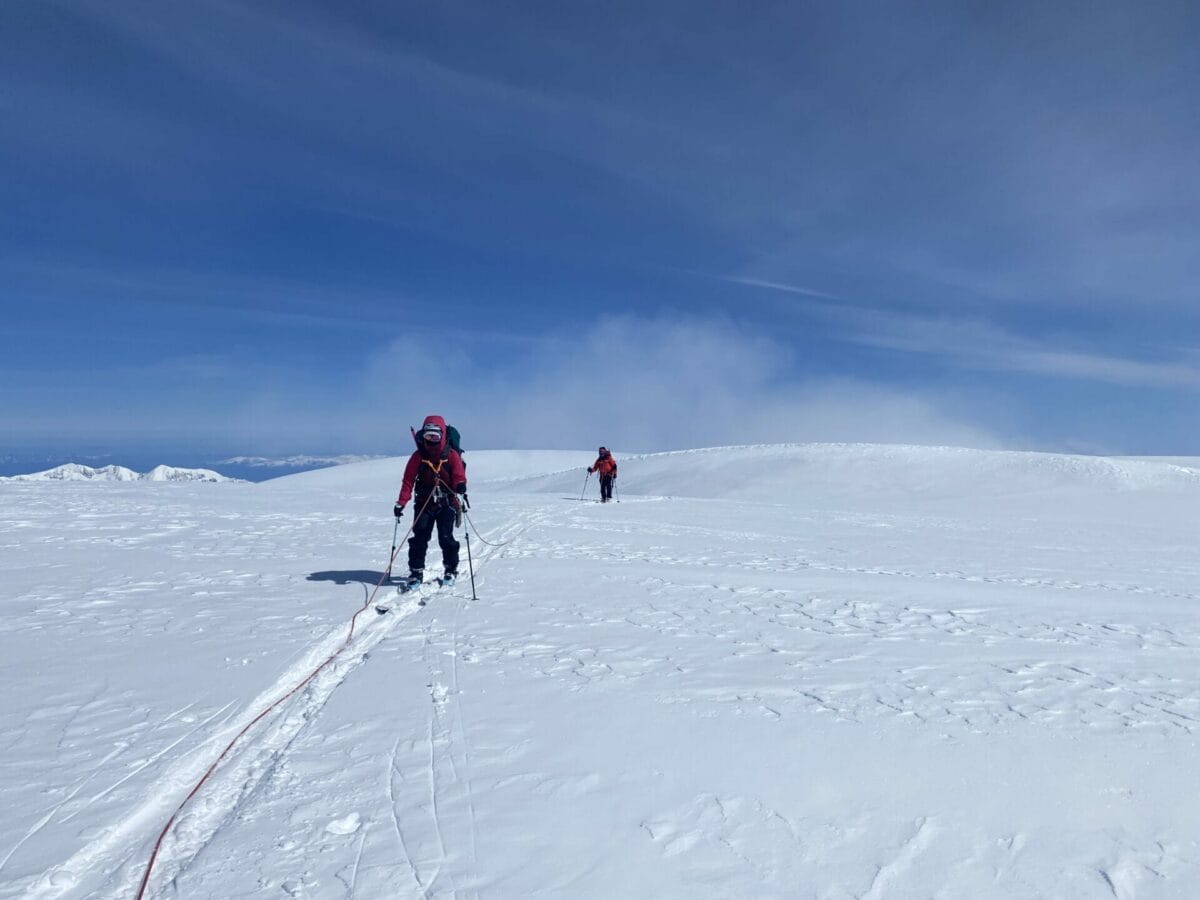
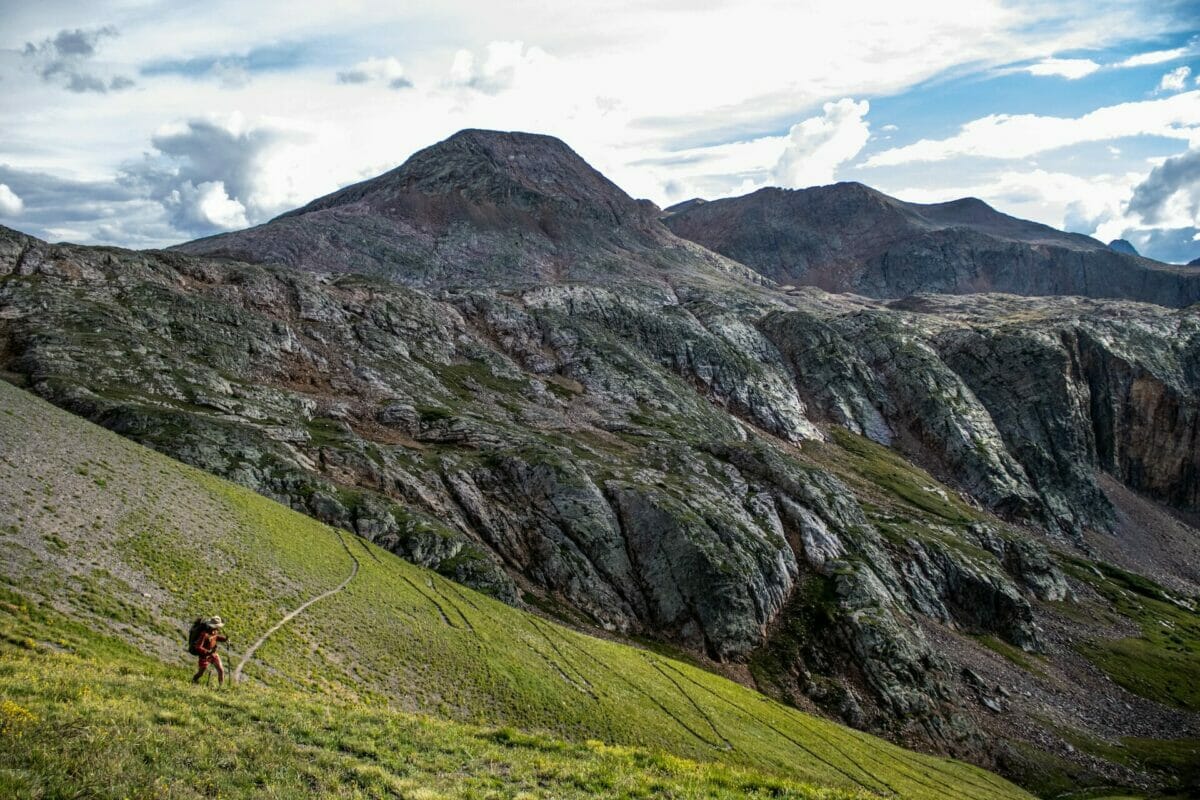
Are you heading out the door for a hike? Fueling up properly before you leave, during your hike, and once you’ve returned to the trailhead can make a profound difference in your hiking experience.
If you’ve ever “bonked” while hiking, found yourself experiencing fatigue or gastrointestinal distress, or have struggled to recover from a hike, this article is for you! Building a solid nutrition foundation for hiking will help you feel and perform your best while hiking and help you recover properly so you can continue to hike to your heart’s content.
In this blog, I will cover hiking nutrition essentials for day hikes. I will discuss backpacking nutrition, which involves many additional considerations, in a future blog!
Please note that I am an affiliate for some of the products I’ve linked to in this post. If you click a link here and make a purchase, I may earn a commission at no extra cost to you.
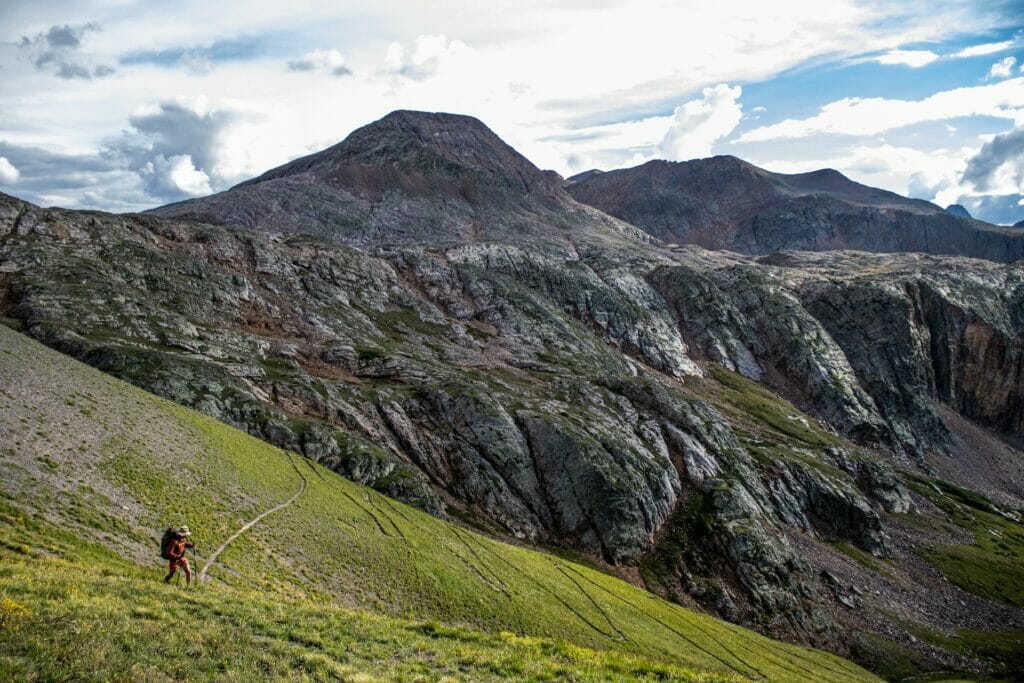
To understand why hiking nutrition matters, let’s start by discussing what your body is doing while you’re hiking!
Hiking is predominantly an aerobic exercise because it is a rhythmic, repetitive activity that uses large muscle groups, can be maintained for an extended period, and requires oxygen to meet the energy demands of the activity (aerobic means “with oxygen”).
While hiking, your body uses oxygen to transform fat (both from body fat and your diet) and carbohydrates (from glycogen in your liver and muscles and your diet) into ATP, your body’s cellular energy “currency” that fuels nearly every bodily process, including exercise. (Source)
When our bodies are metabolically efficient, we are effective at burning fat and carbs for fuel. The ability to effectively burn fat for energy can help you hike longer and stronger without “bonking” while hiking. “Bonking” is a sudden, significant fatigue, that sets in when the muscles become functionally depleted of glycogen, the stored form of glucose in the body.
When you “bonk” you may suddenly feel very tired, your legs heavy and unable to take another step. Nobody wants to bonk while hiking!
People who are over-reliant on carbohydrates for energy (which can be due to eating a processed, high-carbohydrate diet) tend to be less able to utilize fat for fuel and more prone to bonking.
To avoid bonking, they may find themselves constantly eating sugary snacks regularly to keep up their energy. The downside is that this creates a vicious cycle of unstable energy. A high sugar intake also creates potential health problems.
The solution to bonking is to facilitate your body’s ability to burn fat and carbs for fuel. The ability to burn fat for fuel can also result in steadier energy levels throughout the hike. You can then eat modest amounts of carbohydrates periodically to “top off” your fuel tank.
If you want to hike long and strong, balancing the amount of carbohydrates and fat in your diet and avoiding an unhealthy over reliance on carbs is key.
Unlike other forms of endurance activity that require a continuous supply of carbohydrates to promote optimal performance, such as trail running, hiking can largely be fueled by a balanced diet without lots of additional carbohydrates.
The exception would be if you’re trying to complete a hike as fast as possible (such as on a 14er) or hiking for many days in a row (such as with backpacking), in which case you may need to fuel with more carbohydrates, especially carbs that can be rapidly digested.
Hiking nutrition also impacts your ability to recover from a hike. An optimal protein intake, combined with carbohydrates and consuming foods rich in vitamins and minerals, can help your muscles recover so you can hike another day!
Hiking nutrition accounts for the food you eat before, during, and after your hike. Let’s dive into the essentials of hiking nutrition!
It’s a beautiful summer day, and you plan to go on a multi-hour day hike. What should you eat beforehand? Start by eating a balanced breakfast!
Skipping breakfast as part of an intermittent fasting approach has become trendy in recent years. I also have many clients who skip breakfast because they report they aren’t hungry. However, I strongly encourage eating breakfast if you want to feel your best daily, especially before a hike! Eating a balanced breakfast will set the tone for steady blood sugar and energy levels throughout your hike.
A good rule of thumb is to aim for a 2:1 or 1:1 ratio of carbohydrates to protein at breakfast before your hike. To achieve this ratio, you can either familiarize yourself with how many grams of carbs and protein are in foods you commonly eat or use your hands to approximate.
For example, you’d want to eat 30-60 grams of carbs and 30 grams of protein at your pre-hike breakfast. If you don’t want to measure your food, aim to eat a hand-sized serving of a carbohydrate, such as potatoes or fruit, and a hand-sized serving of protein, such as scrambled eggs or a high-quality breakfast sausage.
The ratio of 2:1 or 1:1 is crucial because it will help you maintain stable energy levels rather than experiencing a sudden blood sugar rush followed by a crash (from eating too many carbohydrates and not enough protein).
Here are some ideas for a balanced breakfast:
Ideally, the carbs you include in your pre-hike breakfast should primarily be whole-food carbohydrates. Whole-food carbohydrates are carb-containing foods that have been minimally processed. Examples of whole-food carbohydrates include sweet potatoes, white potatoes, fruit, root vegetables, legumes, and whole grains such as quinoa and steel-cut oats.
Whole-food carbohydrates produce a gentle rise in blood sugar, promoting stable, sustainable energy. This is valuable when you are hiking for hours and need a consistent energy source!
Conversely, refined carbohydrates are carbohydrates that have gone through a manufacturing process. This manufacturing process may turn the carbs into flour and flour-based foods like pasta, bread, and crackers. Refined carbs also include sugars, such as table sugar.
Refined carbs typically produce a sudden spike in blood sugar and energy, often followed by a drop in blood sugar that can cause fatigue and lethargy. Starting your hiking day off with whole-food carbs will provide you with better energy throughout the day.
Pre-hike hydration is also vital. Going into a hike dehydrated is a recipe for feeling poorly. Before your hike, drink at least 12 ounces of water. If you’re also drinking a caffeinated beverage before your hike, such as coffee or tea, drink 12 ounces of plain water in addition to the coffee and tea.
Finally, you must also plan the food and hydration you will bring on your hike. The amount of food and water you’ll bring will depend on multiple factors, including the length of your hike, the environmental conditions (heat, cold, altitude), and your energy and fluid needs.
For a hike under 2 hours, you don’t need to eat anything (unless you actively become hungry during the hike). If your hike is over 2 hours, I recommend bringing several snacks to eat along the way. Bring at least 1-1.5 liters of water.
On the trail, the goal is to maintain steady blood sugar and energy levels and prevent “bonking.” We can accomplish this by selecting snacks that provide whole-food carbohydrates and pairing those whole-food carbs with protein and fat.
Here are some ideas for snacks that will support stable energy levels while you’re hiking:
If you are a female, are hiking for more than two hours, or are hiking quickly, I recommend bringing food options that provide carbohydrates.
The physiology of hiking for more than 2 hours or hiking quickly requires carbohydrate intake to replenish glycogen and maintain a brisk pace.
Trail nutrition options that provide carbohydrates include fresh fruit, dried fruit (try to choose unsweetened dried fruit), sweet potato or plantain chips, and a sandwich or wrap made with high-quality bread or a tortilla. These are examples of whole-food carbohydrates.
If hiking for more than 2 hours, you may benefit from consuming 30-60 grams of carbohydrates per hour. Start at the low end of this range (30 grams) and work up if needed. For example, a medium-sized banana provides 27 grams of carbs.
In addition, pair your carbs with protein; protein will help “meter out” the carbohydrates you absorb, resulting in more sustained blood sugar and energy levels. Using the banana example, you can accomplish this by eating your banana with 2 tablespoons of almond butter.
I’ve noticed some nutrition resources that say “refined sugar is fine” for hikers because physical activity necessitates sugar intake. These resources may even encourage eating foods like gummy worms and Snickers bars while hiking… 🧐
While it is perfectly acceptable to occasionally enjoy foods that contain refined sugars, such as candy, these foods are not an ideal fuel for hikers to consume regularly. As a nutrition professional passionate about helping my clients perform optimally on the trail and achieve their best health, I cannot endorse the recommendation that hikers consume refined sugar regularly. Here’s why:
Most hikers don’t need to fuel with gels, Bloks, and other sugary sports nutrition products. They simply aren’t hiking at an intensity that requires these sugary fuels.
The exception would be if you are speed hiking (such as trying to set speed records on 14ers) or hiking for multiple days in a row, such as with backpacking, and need additional carbohydrates that will be digested and absorbed rapidly.
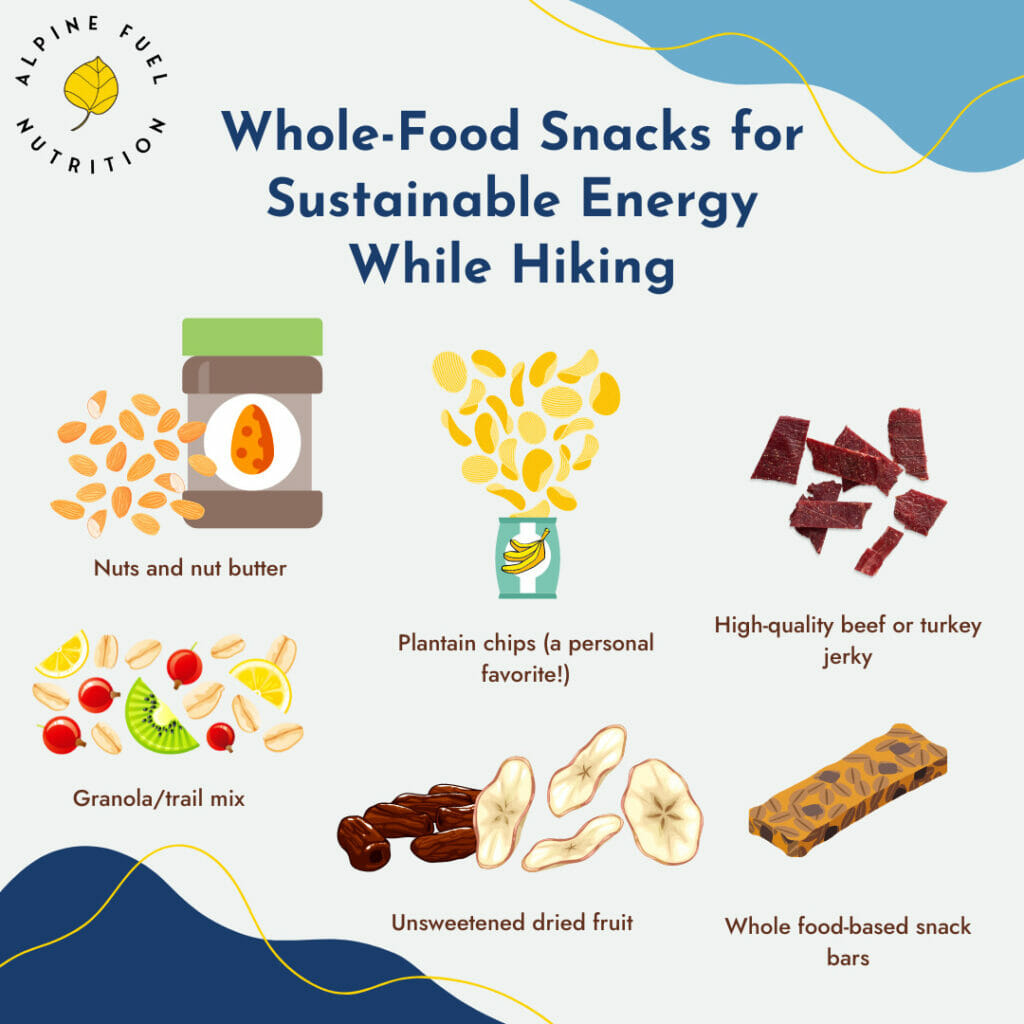
Dehydration resulting in losing 2-3% of body mass may impair endurance performance in activities such as hiking. (Source)
Here are some guidelines for estimating your fluid needs while hiking:
It is also important to consume electrolytes when hiking for more than 2 hours, especially if you are hiking at altitude or are breaking a sweat, provided you don’t suffer from a health condition or take medications that preclude using supplemental electrolytes. I often recommend a low-osmolality electrolyte mix such as Skratch Labs Hydration Sports Drink Mix.
Always consult with your physician before taking any supplement, including electrolyte supplements.
What you eat after hiking is as important as what you eat before and while hiking! Post-hike nutrition supports muscle recovery, allowing muscles to repair overnight so you can go out and hike again the following day, if you so choose! Try to eat a balanced meal within an hour of finishing your hike.
Many hikers do well eating a 2:1 ratio of carbs to protein after a hike. Your muscles will be more sensitive to insulin after a hike and thus more readily able to take up glucose from your bloodstream. This means you can tolerate more carbohydrates after a hike without experiencing a significant blood sugar spike compared to before your hike.
It is crucial to ensure you eat plenty of protein in your post-hike meal. The amino acids in protein are used to repair damaged muscle tissue and support beneficial training adaptations.
Protein needs vary widely from one person to the next. For healthy hikers seeking to maintain their weight, a total daily protein intake of 1.4-2.0 g/kg body weight may be appropriate. Aim to eat 1/3 of your daily protein intake in your post-hike meal.
Eating sufficient carbohydrates after hiking will help you replenish your glycogen stores. Furthermore, research shows that pairing carbohydrates with protein in a post-exercise meal is more effective at replenishing glycogen than consuming carbohydrates alone.
Combining carbohydrate and protein intake may be more effective for replenishing glycogen because leucine, the muscle-building amino acid I discussed earlier, can promote insulin release.
Insulin is a hormone your pancreas makes that helps your tissues take up glucose, including liver and muscle tissues. Combining carbohydrates and protein may also stimulate glycogen synthase, a critical enzyme involved in glycogen formation. (Source, Source)
An excellent post-hike recovery meal would be a stir-fry with ample protein, vegetables, and white rice. I’m also a big fan of a post-hike burger paired with homemade baked fries!
I also recommend incorporating anti-inflammatory foods into your post-hike meal. While inflammation is a normal and desired short-term response to exercise, chronic inflammation can impair exercise recovery and subsequent exercise performance.
Foods with anti-inflammatory properties that may support exercise recovery include fruits like berries, leafy greens like spinach, and omega-3-rich seafood. (Source, Source, Source)
Are you vegetarian, vegan, gluten-free, or dairy-free? Don’t fret! There are plenty of hiking food options for individuals with these dietary restrictions. I speak from experience because I eat a gluten-free and dairy-free diet!
Fresh and dried fruits, nuts, seeds, nut butter, and trail mix are on-the-trail food options that can be enjoyed by vegetarians, vegans, and those on gluten- and dairy-free diets. Individuals on gluten-free diets can choose from many gluten-free and grain-free trail mixes and bar options. For example, Wildway granola is a great gluten-free granola perfect for hiking.
Planning your hiking nutrition can make all the difference in how you feel and function during your hike and your ability to recover afterward. Proper nutrition supports high, sustained energy, prevents “bonking” and fatigue, and will help you enjoy your hikes to the fullest!
If you’ve found this blog helpful, please consider sharing it with a friend! For more nutrition content for mountain athletes, subscribe to my email newsletter and follow me on Instagram and Facebook for updates, nutrition tips, recipes, and more!
If you desire one-on-one, personalized nutrition support to help you reach your hiking goals and optimize your health, I’d love to help you! I’m currently accepting new clients in my nutrition practice. Schedule a free discovery call with me to learn how we can work together.
Would you like a super convenient, easy-to-read, PDF version of this comprehensive blog? Grab your PDF copy of Hiking Nutrition Essentials: Building a Strong Foundation!
The content provided on this nutrition blog is intended for informational and educational purposes only. It is not a substitute for professional medical advice, diagnosis, or treatment. Always seek the advice of your physician or other qualified health provider with any questions you may have regarding a medical condition. Never disregard professional medical advice or delay in seeking it because of something you have read on this blog.
The information and recommendations presented here are based on general nutrition principles and may not be suitable for everyone. Individual dietary needs and health concerns vary, and what works for one person may not be appropriate for another.
I make every effort to provide accurate and up-to-date information, but the field of nutrition is constantly evolving, and new research may impact dietary recommendations. Therefore, I cannot guarantee the accuracy or completeness of the information presented on this blog.
If you have specific dietary or health concerns, please consult a qualified nutritionist or another healthcare professional for personalized guidance.
I empower others through nutrition to conquer their mountain adventures, drawing from my own experiences.
With a background in Biomedical Science and an M.S. in Human Nutrition, I’m a Certified Nutrition Specialist and Licensed Dietitian Nutritionist. My journey in functional medicine has equipped me to work alongside athletes and tackle complex health cases. As a passionate trail runner, backcountry skier, and backpacker, I strive to support others on their paths to peak performance and well-being.


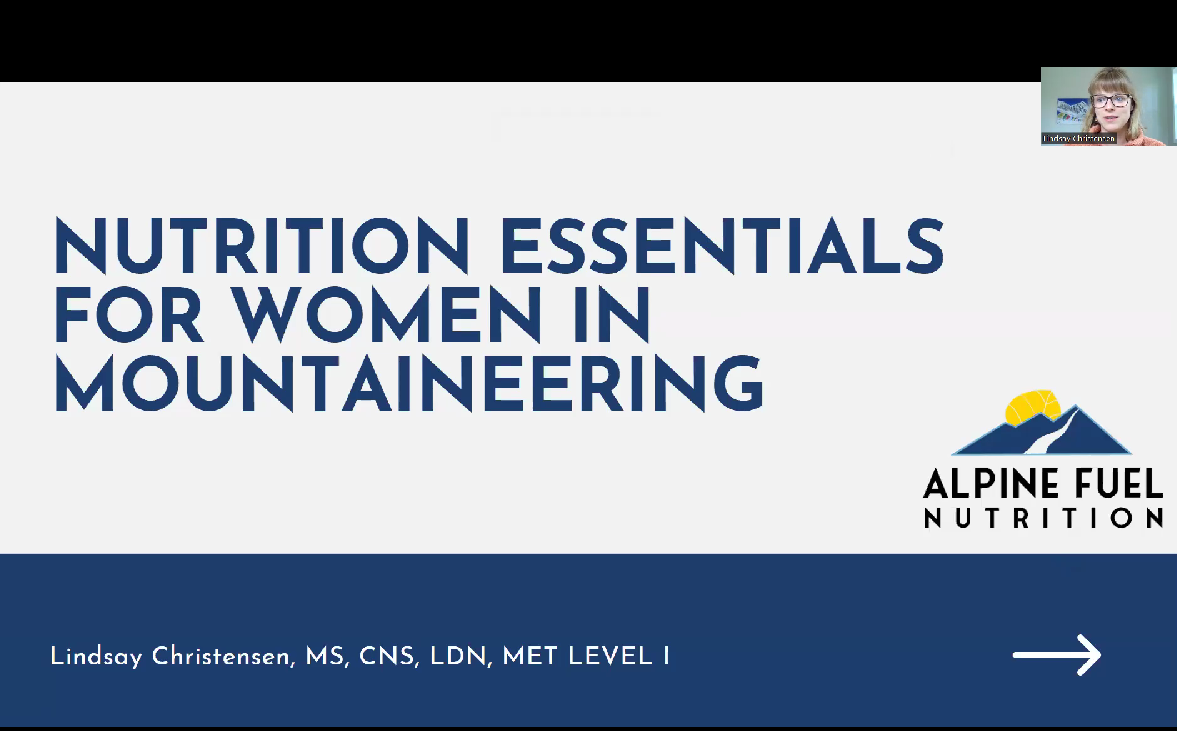

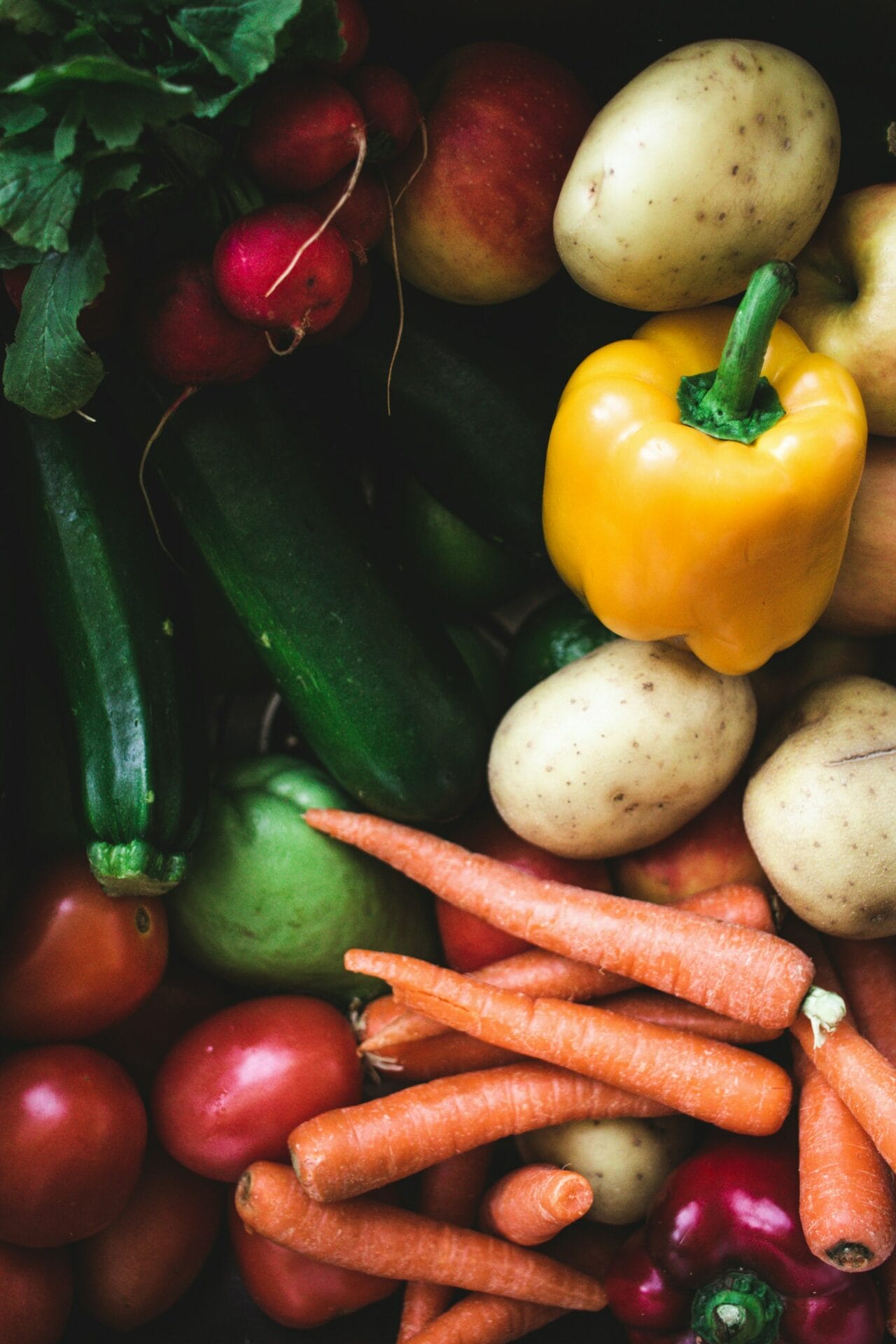
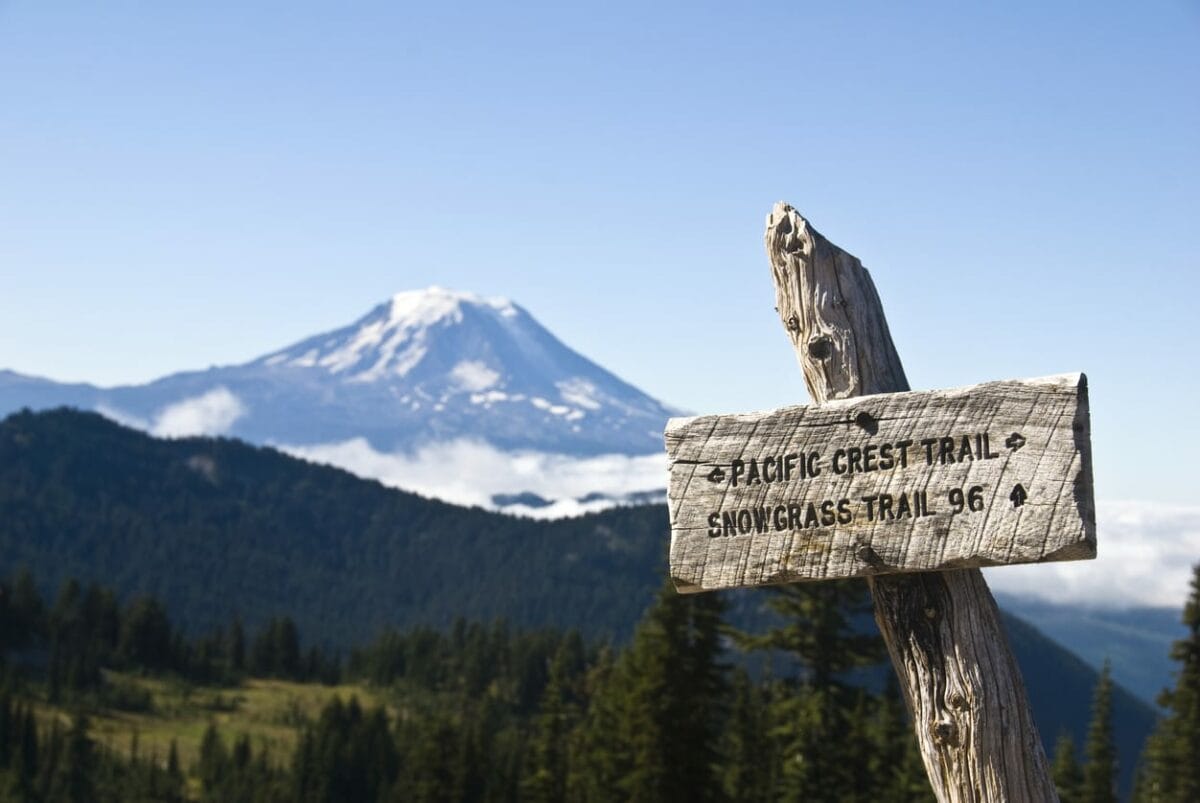
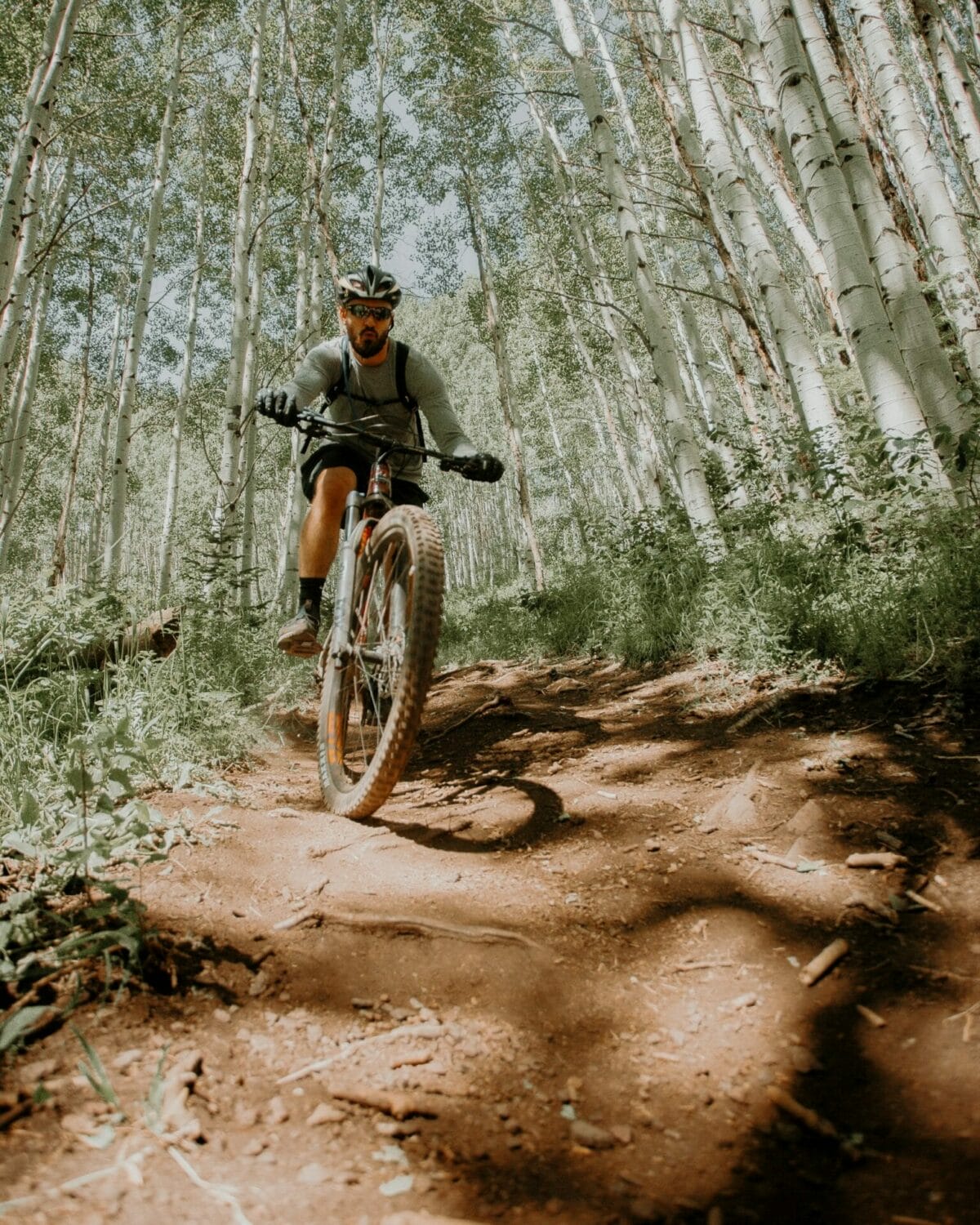
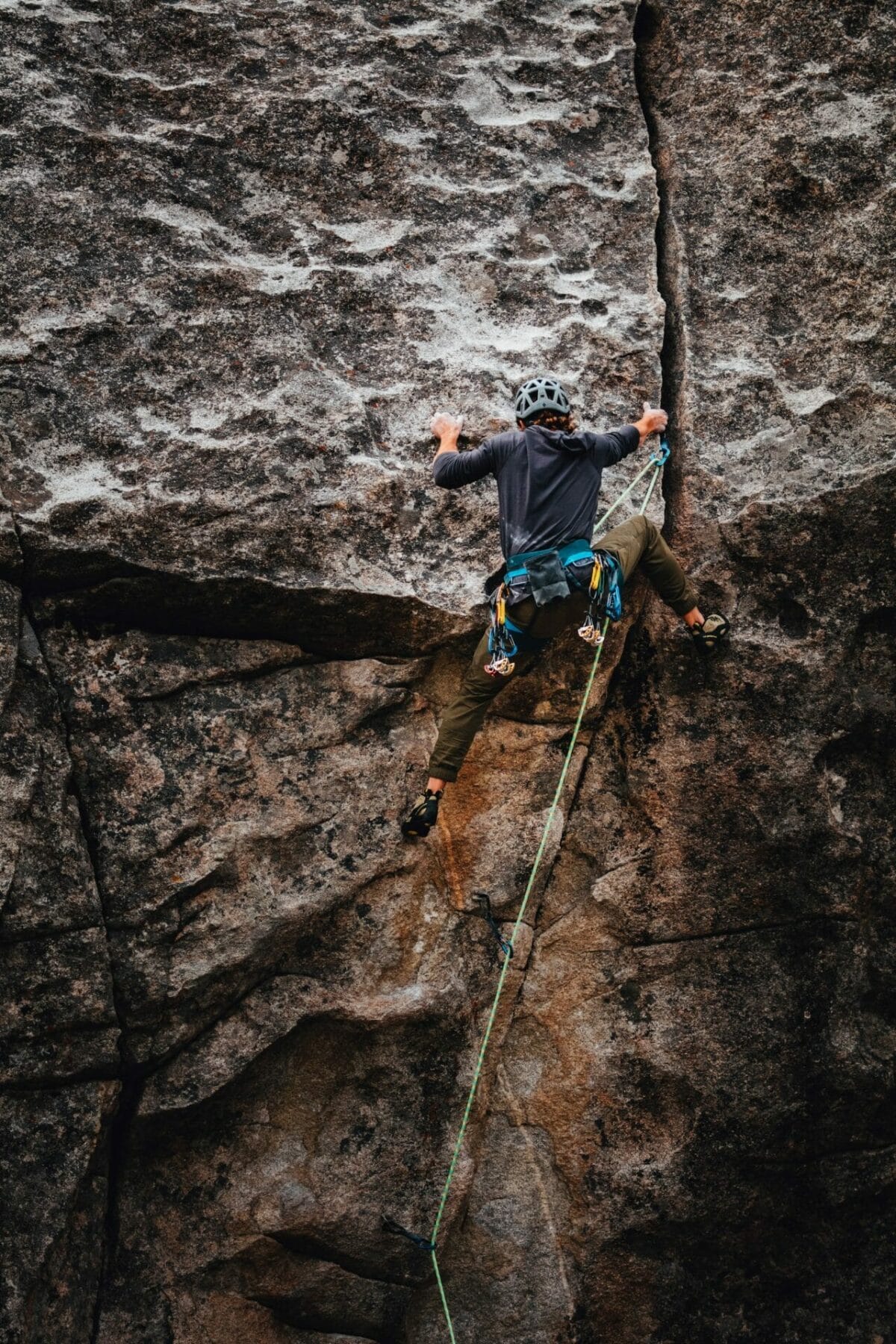
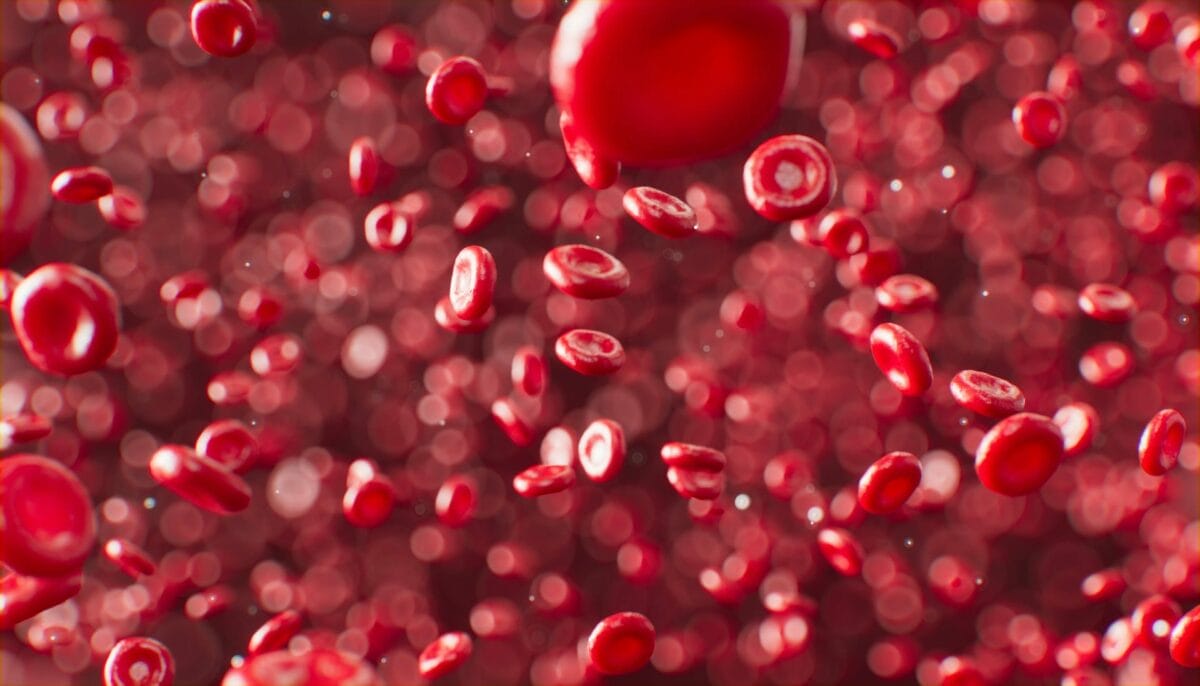
Sign up for updates that come right to your inbox.